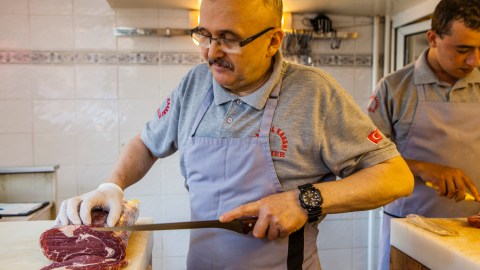More Nations Are Banning Ritual Slaughter. Should Religious Tradition Be Honored Over Animal Rights?

Kosher butchers must have a steady hand. Their ritual slaughter, shechita, must result in one precise cut severing carotid arteries, jugular veins, vagus nerves, trachea, and esophagus; it has to be above the epiglottis but cannot breach the cilia. Observant Jews believe this reduces animal suffering.
The prescription in Islam is similar: one cut separating the carotid arteries, trachea, and jugular veins. In halal preparation the animal may be stunned before slicing; not so in kosher butcheries. Both faiths refuse to eat carrion, though Judaism is more intense in this restriction. Both involve a form of blessing. Kosher foods, in fact, can be eaten by Muslims.
These ancient methods claim to be efficient and painless, which is why the slaughter is so exacting. In fact, these very rituals inspired Temple Grandin to design her now famous restrainer. The ethical rights of animals were first to her mind when imagining this device.
Still, animal rights activists have long argued that the bleeding out of animals, especially in kosher preparation in which they are completely lucid when the incision is made, is cruel punishment for a dying animal. Now, in the Netherlands, those activists are starting to win.
Responding to pressure from the activists, Jewish and Muslim groups have agreed to make changes in an effort to preserve their slaughtering practices. It has come to illustrate a broader debate across Europe that has pitted advocates of religious freedom and minority rights against a growing movement for animal rights.
These changes began in 2010, when the political party, The Dutch Party for the Animals, won five seats in Parliament. Though their first measure was rejected in the senate, the higher body did recommend stricter rules be put into place for the welfare of animals.
The notion of considering animals is not new, though previous efforts are rooted in anti-religious sentiments. As far back as the eighteen-eighties anti-Semitic groups teamed up with animal rights advocates to outlaw kosher preparation. Scandinavian history professor Michael Metcalf notes that while animals rights groups began appearing in the eighteen-fifties, it was not until teaming up with anti-Semites that the movement gained political traction in 1884.
Not all legislation was anti-religious, however. In February 2014, Denmark outlawed ritual slaughtering without first stunning the animals, a move that Finland has had on its books since 1934. Poland banned non-stunned animals in 2013, losing an estimated half-billion euro market to neighboring countries. Sweden deemed the ritual slaughter of cattle without stunning illegal in 1937, adding chicken to the list in 1989.
Not all countries are so demanding. Latvia legalized ritual slaughter in 2009, while Spain’s ambiguous ruling leaves plenty of leeway for religious authorities to decide for themselves. The United States requires that butchers comply with two humane methods: animals must be “rendered insensible to pain” by any number of techniques or they must lose consciousness by “the simultaneous and instantaneous severance of the carotid arteries.” Given that stunning is not recommended, US law is also open for interpretation.
While the validity of animal rights will likely be debated for decades or longer, Jews and Muslims in the Netherlands are not as concerned with the welfare of their food as they are with themselves. Both parties feel this recent ruling will stoke anti-Semitic and anti-Islamic feelings in a nation in which tensions are already high. As Moshe Kantor, president of the European Jewish Congress, told the NY Times:
Some of those who try and ban our customs are in essence trying to make Europe more uncomfortable for Jews, because the essence and centrality of our life are our ancient traditions, and if our customs are not welcome nor are our communities.
Yet at some point a more humane approach to slaughter needs to be implemented. In America the problems with industrial agriculture and livestock are well-known, even if little is being done on the legislative level to combat environmentally damaging trends being caused by our food production system. In fact, our government goes to great lengths to hide the damage of carbon emissions being released by meat production. The ways we kill are also killing us.
Let’s face it: bigotry is not going to end by honoring archaic food rituals. That’s a talking point, not a realistic path toward equality. That we can’t implement unity among religions is no reason to increase the suffering of other species. Eventually we have to honor science, and consciousness studies consistently show other animals experience a range of emotions, including pain and suffering.
While I’m not advocating for veganism, it is obvious that taking cues from ancient texts needs to be abandoned if those cues increase suffering. No tradition is worth the sustaining and continuation of unnecessary pain. It’s pretty clear letting an animal bleed out for forty seconds without stunning them first provides such an increase.
Humans in large part evolved dramatically thanks to a diet rich in meat, especially one that involved cooking that source of protein. That we should be so careless about how we acquire it does not benefit anyone, ourselves included.
—
Derek Beres is the author of Whole Motion: Training Your Brain and Body For Optimal Health. Based in Los Angeles, he is working on a new book about spiritual consumerism. Stay in touch on Facebook and Twitter.





